- Home
- Iain Pears
The Last Judgement
The Last Judgement Read online
The Last Judgement
Iain Pears
HarperCollins Publishers (2013)
* * *
Witty Italian art-history crime series featuring English dealer Jonathan Argyll, from the author of the best-selling literary masterpiece, 'An Instance of the Fingerpost'.
Paris can do strange things to a man's mind... like making him agree to an apparently harmless favour of escorting a picture to Rome.
'The Death of Socrates' is a particularly nondescript piece, so art dealer Jonathan Argyll can sympathize when its recipient refuses to accept delivery. But in an unusual twist, the same man is found dead a few hours later. Surely the painting wasn't that bad?
Now caught up in a murder investigation, Jonathan recalls an attempt to steal the artwork while he was at the train station. Could this be the killer? The bodies start piling up and Jonathan must uncover the dark wartime secret at the heart of the mystery -- before someone puts him out of the picture for good.
IAIN PEARS
THE LAST JUDGEMENT
To my parents
Contents
Cover
Title Page
Dedication
1
2
3
4
5
6
7
8
9
10
11
12
13
14
15
16
17
18
19
20
About the Author
By the Same Author
Copyright
About the Publisher
Some of the pictures and buildings mentioned in
this book exist, others are invented and all the
characters are imaginary. There is an Italian art
squad in a building in central Rome, but I have
arbitrarily shifted its affliction from the
Carabinieri to the Polizia to emphasize that mine
has no relation to the original.
1
Jonathan Argyll stared transfixed at the scene of violence that suddenly presented itself as he turned around. The dying man, tormented by agony but bearing the pain with fortitude, lay back in a chair. On the floor beside him was a phial that had dropped from his hand; it took little intelligence to realize it had contained poison. The skin was pale and his hand, clenched into a fist, hung down loosely towards the ground. To the left was a group of onlookers, friends and admirers, variously weeping, angry or merely shocked at the sight.
It was the face, though, that grabbed the attention. The eyes were open and glazed, but it had dignity and tranquillity. It was the face of a martyr, who died knowing that others would mourn him. Death would not end his renown, but merely extend and complete it.
‘Nice, eh?’ came the voice at his side.
‘Oh, yes. Very.’
He squinted in a professional fashion. Death of Socrates, at a rough guess, complete with disciples in attendance. Just after the old buffer has been sentenced to death for corrupting youth and drinks the hemlock. Not bad stuff, on the whole, but liable to be expensive. French school about 1780, or thereabouts, and much more pricey bought in Paris than elsewhere. The thought, as so often, dampened his ardour. He looked again, and reassured himself that maybe it wasn’t so desirable after all. Evidently not a well-known artist, he told himself. Needed a bit of a wash and brush up. Come to think of it, the treatment was quite cold and stiff as well. The fact that he didn’t have much money to spare at the moment completed his transformation of opinion. Not for him, he decided with relief.
Still, one must make conversation. ‘How much are you asking for this?’ he asked.
‘Sold already,’ the gallery-owner replied. ‘At least, I think it is. I’m just about to send it off to a client in Rome.’
‘Who did it?’ Argyll asked, mildly jealous to hear of anybody managing to sell a painting. He hadn’t managed to unload one himself for months. Not at a profit, anyway.
‘It’s signed by Jean Floret. Who he was I have no idea, but not what you might call a major figure. Fortunately that doesn’t seem to bother my client, God bless him.’
The man, a distant colleague of Argyll’s who had taken one or two drawings off him in the past, gazed with a satisfied expression at the painting. He was not a hugely pleasant character; a bit too sharp round the edges for Argyll’s taste. The sort of person where you made sure to check your pockets when leaving his company, just to make certain all the chequebooks and credit cards were still in place. Not that he’d ever done anything bad to Argyll, but the Englishman was determined to make sure he never got the chance, either. He was learning fast about the art business. People were friendly enough, and helpful enough, but occasionally came over a bit funny when money was involved.
He was standing in Jacques Delorme’s gallery about halfway up the Rue Bonaparte, a few hundred yards from the Seine. A noisy, fug-filled street, lined with booksellers and print shops and the lesser sort of art dealer; the sort of people who sold cheaper paintings but knew a lot about them generally; unlike the wealthy lot in the Faubourg St-Honoré, who unloaded vastly expensive tat on gullible foreigners with more money than sense. It made them more agreeable company, even though the surroundings were less chic. Delorme’s gallery was a little dingy, and outside the cars tooted their horns alarmingly close to the main entrance, this being one of those Parisian streets where pavements were more concept than reality. The weather didn’t help the slightly gloomy atmosphere either; the sky was leaden, and it had been raining more or less since he’d arrived in Paris two days before and was still splashing quietly but persistently into the gutters then gurgling down the drains. He wanted to go home, back to Rome where the sun was still shining, even in late September.
‘Just in the nick of time, frankly,’ Delorme went on, blithely unaware of Argyll’s disapproval of the northern European climate. ‘The bank was beginning to become very troublesome. They were muttering about the size of my loans. Reconsidering their position. You know how it is. Once I get the money for this, I should be able to fend them off for a while.’
Argyll nodded as sympathetically as he could manage. He didn’t have a gallery himself, but even in his low-cost, working-from-home venture, it was tough earning a decent living. The market was bad. The only thing worse was conversation with colleagues, as they managed to talk about nothing else except how dismal life was at the moment.
‘Who is this man with money, anyway?’ he asked. ‘He doesn’t want any nice baroque religious pieces, does he?’
‘Got a surfeit, have you?’
‘One or two.’
‘Sorry. Not as far as I know, anyway. He particularly wants this one. The only problem is how to bring him and it into contact soon enough to satisfy my creditors.’
‘I wish you luck. Have you had it for a long time?’
‘No. I wouldn’t spend money on something like this unless I knew I could unload it fast. Not at the moment. You know how it is …’
Argyll did indeed. He was in something of the same position himself. A properly disciplined art dealer would act like any other business. Small stock, high turnover. The picture trade didn’t seem to work like that, somehow. Paintings just demand to be bought, even though there may be no client in sight. So Argyll had lots of them now; many had been hanging around for months, and almost no one was buying anything.
‘Now, about these drawings,’ Delorme continued.
And so they got down to some hard bargaining. It wasn’t so difficult, considering that Delorme’s bank was pressuring him to sell something and Argyll was more or less under orders to buy the drawings whatever the price.
It was the only thing keeping him going at the moment, his part-time post as European agent for an American museum. Without that he would have been in real trouble. It had been decided months ago that it really ought to have a Prints and Drawings collection, as it had a Prints and Drawings room with nothing to put in it. So when Argyll mentioned that he’d heard of a Boucher portfolio wandering around the Paris market, he’d been instructed to go and get it. And if he saw anything else …
He had. He’d dropped in on Delorme, whom he’d met a year or so back, and the Frenchman mentioned this Pontormo sketch. A quick telephone call to California and the bargaining could get under way.
The mutually enjoyable haggle ended satisfactorily; more than the drawing would have fetched on the open market, but a decent price none the less. A little ruthlessly, Argyll exploited the fact that Delorme evidently needed the cash. One thing about the Moresby Museum, it paid fast. Business was concluded with a promise of cash on delivery, a cup of coffee, a shake of the hand and a mutual sense of well-being. All that was needed now was a rudimentary letter of contract.
The only snag was the tiresome business of getting all his drawings off to California. Argyll just about knew his way around the Italian bureaucratic labyrinth; the French one was entirely different. He wasn’t looking forward to spending the next couple of days hanging around offices in Paris, trying to get all the forms signed.
Then he – maybe it was a hint from Delorme that jogged his mind – had one of those little ideas which are devastatingly brilliant in their simplicity.
‘Tell you what,’ he said.
‘Hmm?’
‘That picture. Your Death of Socrates. How about me taking it to Rome for you, to deliver to this client of yours? In return, you could do the paperwork for these drawings and send them off for me.’
Delorme thought about it. ‘That’s not a bad idea, you know. Not bad at all. When would you go?’
‘Tomorrow morning. I’m finished here. The only thing keeping me was the prospect of getting all the export licences.’
The Frenchman nodded as he thought it over. ‘Why not?’ he said eventually. ‘Why not indeed? It would be more convenient than you can imagine, in fact.’
‘Will it need export permission as well?’
Delorme shook his head. ‘Well, technically, maybe. But it’s only a formality. I’ll deal with that, don’t worry. You just take it out and I’ll square it with the powers that be.’
OK, so it was a little bit dishonest. But not much. It was hardly as if he were taking out the Mona Lisa. The only tiresome thing was that it meant Argyll would have to carry it by hand. Packers and shippers require lots of formal bits of paper with stamps on them.
‘Who is the lucky buyer?’ Argyll asked, ready to write the name and address down on the back of a cigarette packet. Somehow he had missed the Filofax generation.
‘A man called Arthur Muller,’ replied Delorme.
‘OK. Address?’
Delorme fumbled around – he was almost as badly organized – then fished out a scrap of paper and dictated. It was a street Argyll didn’t know, up in the north where the rich folk live. No great trouble; of course, it was a little below his dignity as an up-and-coming international dealer to be running around acting as someone else’s courier, but that didn’t matter so much. Everybody’s life would be made a lot simpler; and that was what counted. With the feeling that he had accomplished something useful on this trip after all, he wandered off into the street for lunch.
The next morning, he was sitting in the great restaurant of the Gare de Lyon, drinking a coffee and sitting out the twenty minutes or so before his train left on the journey south. His early arrival – he’d been in the station for half an hour or so already – was due to a combination of factors. Partly it was because he was congenitally incapable of giving trains a chance to sneak off without him; he liked to have them under his eye well in advance just in case they got ideas.
Next, the Gare de Lyon was, of all the stations in the world, his favourite. It brought a touch of the Mediterranean into the gloomy, north-European air. The tracks stretched off into the distance, heading for those magical places he had adored long before he ever ventured out of his wind-swept little island to see them for himself. Lyon, Orange, Marseille, Nice; on to Genoa, through the hills of Tuscany to Florence and Pisa, then across the plains of the Campagna to Rome before heading ever further south to Naples. Warmth, sun, terracotta-coloured buildings, and an easy-going, relaxed gentleness completely alien to the lands bordering the North Sea.
The station itself reflected this in its exuberant architecture and pompous, ridiculous and entirely lovable bar, covered with gilt and plasterwork and swags and paintings, all combining to evoke the earthly paradise at the far end of the track. It was almost enough to make the most hardbitten of travellers forget he was in Paris, and that the rain was still coming down in cold, wet, autumnal torrents.
The bar was fairly empty, so he was mildly surprised when he suddenly acquired some company. With a polite ‘May I …?’ a man in his late thirties sat down beside him. Very French, he was, with his green Alpine raincoat, casually expensive grey jacket. A very Gallic face as well, darkly handsome and marred only by a small scar above his left eyebrow that was partly hidden by the long dark hair that swept down from a high-domed forehead in the peculiar cut that France’s educated middle classes seem to favour. Argyll nodded politely, the man nodded back and, the requirements of civilization satisfied, both settled back to hide behind their respective papers.
‘Excuse me,’ said the man in French as Argyll was halfway through a depressing account of a cricket match in Australia. ‘Do you have a light?’
He fumbled through his pocket, fished out a bashed box, and looked in it. Then he took out his cigarettes and looked in that also. No cigarettes either. This was becoming serious.
They commiserated together for a while, and the Englishman considered the awful implications of a thousand-mile train journey without nicotine.
‘If you’d guard my bag,’ said the man opposite, ‘I’ll go and get some from the platform. I need a new packet myself.’
‘That’s very kind of you,’ said Argyll.
‘Do you know the time, by the way?’ he said as he got up to go.
Argyll looked at his watch. ‘Quarter past ten.’
‘Damn,’ he said, sitting down again. ‘My wife is meant to be meeting me here at any moment. She always gets so upset if I’m not where I say I’ll be. I’m afraid we’ll have to go without.’
Argyll thought about this. Obviously, if this man was prepared to trust him with his bags, then it should be safe to reverse the process. ‘I’ll go instead,’ he offered.
‘Would you? That’s very good of you.’
And with an encouraging smile, he promised to guard the bags faithfully until Argyll returned. It’s one thing about the international confraternity of smokers. Members know how to behave properly. It’s what comes of being an embattled and persecuted minority. You stick together.
Argyll was halfway out of the door when he realized he hadn’t brought any money with him. All the small change he had was in the pocket of his overcoat, lying draped over the chair. So he cursed, turned round and mounted the cast-iron steps back to the bar.
As Flavia explained afterwards, not that he needed any explanation by then, it was the oldest trick in the book. Start up a conversation, win their confidence, distract their attention. Compared with someone as naturally trusting and gullible as Argyll, babies would probably put up a more spirited resistance defending their candy.
But fortune, this grey morning, decided to give him a break. He got to the entrance door just in time to see the man who was meant to be guarding his bags disappearing through the door on the far side of the room. Tucked under his arm was a brown paper package about three feet by two. Approximately the same size as paintings of the Death of Socrates tend to be.
‘Oy,’ called Argyll in some distress.<
br />
Then he ran like fury in pursuit, appalling consequences flowing through his mind. He was sure the painting wasn’t worth much; but he was equally sure he would have to refund more than his bank balance could withstand if he let it get away. It wasn’t courage that made him fly across the bar, then run three steps at a time down the stairs. It was simple terror at the thought of this painting escaping him. Some dealers are insured against this sort of thing. But insurance companies, even the most amiable, do not look very sympathetically on claims for thefts committed on paintings left unguarded in bars in the company of total strangers.
Argyll was no sportsman. While not badly coordinated, he had never really thought it worth his while to spend much time trotting around cold, muddy fields in pursuit of inflated bladders. A decorous game of croquet he could manage, but greater athleticism was not at all to his taste.
For this reason the flying tackle he produced, running at full tilt and launching himself from a distance at the legs of the disappearing Frenchman was all the more miraculous for having no forebears. One onlooker in the crowded railway concourse even burst into spontaneous applause – the French, more than most, appreciate elegance on the rugger pitch – at the perfectly timed way in which he flew at low altitude through the air, connected with the man’s knees, brought him down, did a half-roll, grabbed the parcel and stood up, clutching the prize to his chest.
The wretched man didn’t know what had hit him; the violence of Argyll’s assault, and the hard concrete floor, knocked the wind out of him and apparently did severe damage to the funny-bone of his right knee. Easy pickings, if Argyll had had the presence of mind to call for the police. But he wasn’t thinking about that; rather he was too busy clutching the painting, relief at his success and distress at his own stupidity over-whelming him.
By the time he had recovered enough, the thief had rolled over, hobbled off and disappeared into the early-morning crowd thronging the concourse.

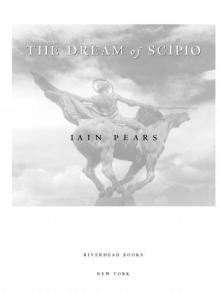 The Dream of Scipio
The Dream of Scipio Stone's Fall
Stone's Fall The Last Judgement
The Last Judgement An Instance of the Fingerpost
An Instance of the Fingerpost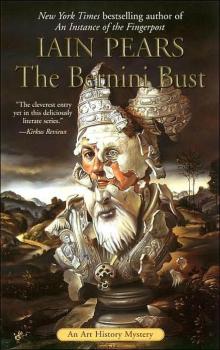 The Bernini Bust
The Bernini Bust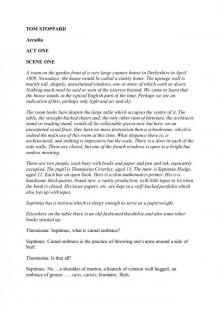 Arcadia
Arcadia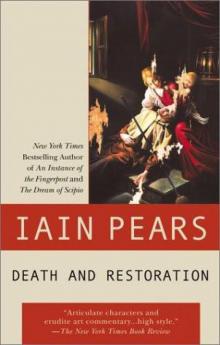 Death and Restoration
Death and Restoration The Raphael Affair
The Raphael Affair The Titian Committee
The Titian Committee The Immaculate Deception
The Immaculate Deception Giotto's hand
Giotto's hand The Portrait
The Portrait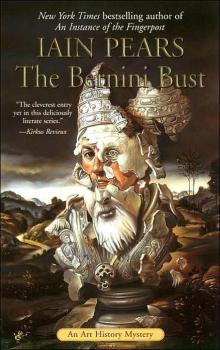 The Bernini Bust ja-3
The Bernini Bust ja-3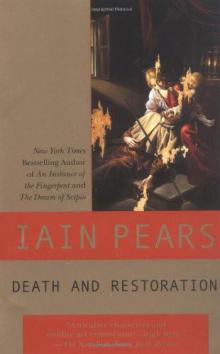 Death & Restoration ja-6
Death & Restoration ja-6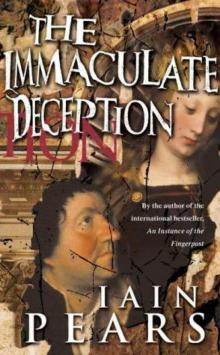 The Immaculate Deception ja-7
The Immaculate Deception ja-7